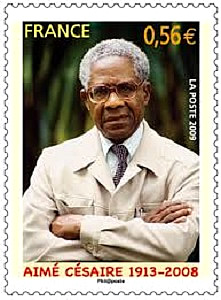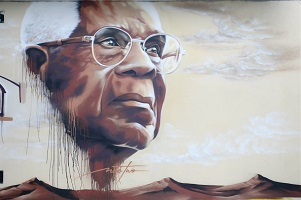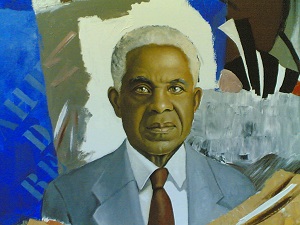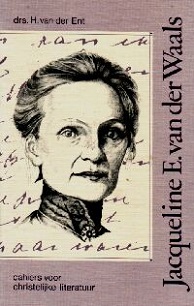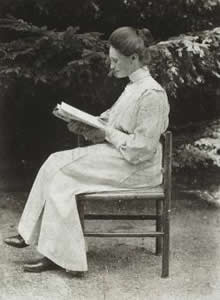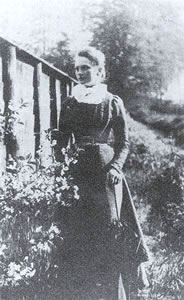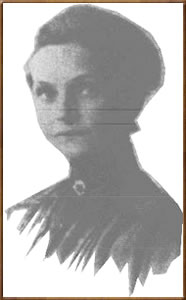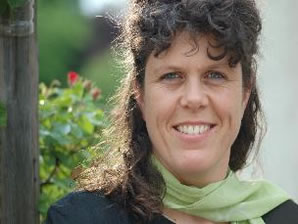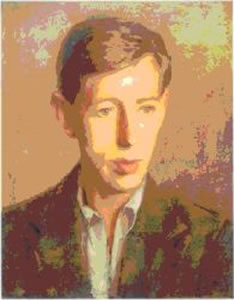De Afrocaraïbische schrijver en politicus Aimé Césaire werd geboren op 26 juni 1913 in Basse-Pointe, Martinique. Zie ook alle tags voor Aimé Césaire op dit blog.
From My Stud Farms
Clouds, jump the tracks with a blowtorch! Rain violent girl unravel your shreds! Sea wound settle in with a hiss! All funnels and volcanoes adrift! Stampede mad gods! Blow your brains out! Let the fields be ripped apart by the trident and the pearl fishermen be catapulted to the very sky! A thought. What? The fire that is no longer squandered. What is possible tearing in its sumptuous chest everything slow in becoming.
Night. What? The entire matter which weighs and exhausts itself to become space. The password. What? To pass the world through a sieve and the lack of solidarity in each subterfuge.
Times of lightning, times of lightning, placid beasts, frenzied beasts, plodding beasts, at my call by nostrils and foamings you used to run out of the stables of the sky
and there were marvelous multicolored
prairies of every trot and every
shade of bay which grew for the desire of these fiery beasts
young and brushed by coco plums
under the tender skin of water forever dazzling
Vertaald door Clayton Eshleman
Calme
pousseront leur douce tête violente de torturé à travers la
claire-voie que deux à deux font les paroles les lianes dépêcheront du fond de leurs veilles une claire batterie de sangsues dont l’embrassade sera de la force irrésistible
des parfums de chaque grain de sable naîtra un oiseau de chaque fleur simple sortira un scorpion (tout étant recomposé)
les trompettes des droseras éclateront pour marquer l’heure où abdiquer mes épaisses lèvres plantées d’aiguilles en faveur de l’armature flexible des futurs aloès
l’émission de chair naïve autour de la douleur sera généralisée
hors de tout rapport avec l’incursion bivalve des cestodes cependant que les hirondelles nées de ma salive agglutineront
avec les algues apportées par les vagues qui montent de toi le mythe sanglant d’une minute jamais murmurée aux étages des tours du silence les vautours s’envoleront avec au bec
Aimé Césaire (26 juni 1913 – 17 april 2008)
Als graffiti
De Nederlandse dichteres Jacqueline Elisabeth van der Waals werd geboren op 26 juni 1868 in Den Haag. Zie ook alle tags voor Jacqueline van der Waals op dit blog.
Bergen
Nu zien de grote bergen op mij neder.
Ze zijn verwonderd, dat ik al zo lang
Alleen geklommen ben, en half nieuwsgierig,
Half spelend volgt hun oog mijn trage gang.
Nu zien de bergen goedig op mij neder,
Terwijl ik altijd verder, rusteloos
Naar boven klauter naar hun kale toppen.
Niet ongeduldig zijn ze en niet boos
Om mijn vermetelheid; ze kijken rustig
Zoals mijn oog soms spelend nederziet
Op ’t trage rupsje kruipend op mijn vinger,
En doelloos zijn bewegingen bespiedt.
De goede bergen zijn nu heel voorzichtig,
Ze houden zich stil, opdat vooral
Geen steentje los zou laten waar ik klauter,
Geen steen mij treffen zoude in zijn val.
Ze houden zich heel rustig, maar ten laatste
Wanneer dat stille kijken hen verveelt,
Beginnen zij een spel, dat ik zo dikwijls,
Het arme rupsje plagend, heb gespeeld.
Dat zag ik verder kruipen, onverdroten,
En argeloos, terwijl ik keer op keer
De eerste hand achter de tweede plaatste;
En ’t plagend spel herhaalde ik telkens weer.
Zo zie ik nu de bergen met mij spelen,
En na de top, die mij de hoogste scheen,
Zag ik nog steeds een hoogre top verrijzen,
En wat ik eerst een top dacht, was er geen.
Toch klom ik voort en laat ze met mij spelen,
Die grote bergen met hun logge kracht;
Ze menen ’t niet zo kwaad en vol vertrouwen
Begeef ik mij weer telkens in hun macht.
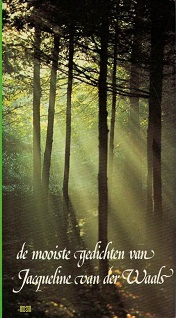
Jacqueline van der Waals (26 juni 1868 – 29 april 1922)
Cover
De Nederlandse schrijfster, dichteres en vertaalster Annie Salomons (eigenlijk Anna Maria Francisca van Wageningen-Salomons) werd geboren in Rotterdam op 26 juni 1885. Zie ook alle tags voor Annie Salomons op dit blog.
Moderne Eva
O, kindren, kindren, die nooit wezen zult,
Omdat uw moeder alle warmte weerde,
En liever ’t hart door eigen gloed verteerde,
Dan u te dragen in een schoongeduld…
Hoe heeft uw liefheid toch mijn droom vervuld,
Als in de nacht de schimmen wederkeerden,
Die daags ik uitdreef, naar ’t mijn wil begeerde,
Maar die dan kwamen, klagend hoogmoed’s schuld.
O, kindren, kindren, die nooit zult zijn
Wat baat het eer en roem en glans te dragen,
Als niets ons bijblijft, dan een droge dorst…
Omdat de martelendste barenspijn
Toch nooit zo wreed kan wezen als het knagen,
Dat nooit uw mondje ik voelde aan mijn borst.
Herinnering
Scherp verstand wist te verzamelen
klaar bewezen grief op grief.
’t Domme hart kon enkel stamelen
‘k heb je lief, ik heb je lief
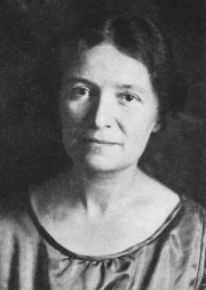
Annie Salomons (26 juni 1885 – 16 januari 1980)
De Canadese schrijver Yves Beauchemin werd geboren op 26 juni 1941 in Rouyn-Noranda, Quebec. Zie ook alle tags voor Yves Beauchemin op dit blog.
Uit:Du sommet d’un arbre
“1er mars
J’ai commencé aujourd’hui la rédaction de mon troisième roman. Voilà plusieurs semaines que je repoussais la minute de vérité. Depuis cinq ou six ans, j’accumulais pêle-mêle des matériaux dans mes petits calepins noirs. Il y a un an, j’ai commencé à mettre un peu d’ordre dans ce fouillis, retranscrivant tout dans un cahier, sur la couverture duquel j’avais écrit en grosses capitales:
ROMAN III, un peu comme ces compositeurs à grosse tête et petites lunettes qui baptisent leurs oeuvres expérimentales: Ambiance IV, Atmosphère II, Cosmogonie XIV ou Bio-transmutation 118 et autres turlupinades post-viennoises du même genre. Six mois plus tard, je commençais les premières esquisses de mon plan. Vers la mi-janvier, je me suis mis à la rédaction de mon résumé final.
Première difficulté: les noms des personnages.
J’en avais trouvé quelques-uns, mais il restait bien des baptêmes à faire.
Or comment connaître un personnage quand on ne l’a pas fait vivre par l’écriture? Et quand on le connaît mal, comment lui trouver un nom? Dan mon esprit, en effet, il y a une sorte de lien magique entre le nom d’un personnage et ce qu’il est. Je procède avec les mêmes tâtonnements anxieux des futurs parents qui cherchent par unprénom à cerner — ou fixer? — la personnalité du petit foetus en train de se balancer dans le ventre de sa mère, un pouce dans la bouche. Je consulte des liste de prénoms, des dictionnaires de synonymes, je fouille dans des annuaires téléphoniques, attendant que le déclic se produise. Pourquoi Juliette et non Hortense? Pourquoi Pomerleau et non Gratton? Je tiens ma logique soigneusement à l’écart pour laisser mon inconscient s’amuser tout son soûl. Et à chaque déclic je remercie Freud à genoux. Enfin ma liste est prête. Bien des personnages viendront s’ajouter par surprise au cours du récit.
C’est à ce moment que se présente la minute de vérité. Jusqu’ici, je préparais mon roman. Maintenant, il faut le faire.
Je ne suis pas le premier écrivain que le moment de la première phrase fait frémir.
C’est une réaction aussi banale que le mal de mer. Mais elle tord diablement les tripes! Comme le saut dans le vide.”
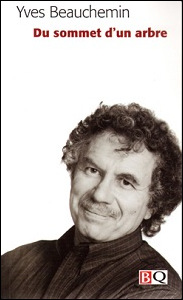
Yves Beauchemin (Rouyn-Noranda, 26 juni 1941)
Cover
De Duitse schrijfster Elisabeth Büchle werd geboren op 26 juni 1969 in Trossingen, Baden-Württemberg. Zie ook alle tags voor Elisabeth Büchle op dit blog.
Uit: Himmel über fremdem Land
„In den Augen ihrer Schwester war Demy allerdings alt genug, ihr in Berlin als Gesellschafterin zu dienen – was auch immer sie als solche tun sollte.
Demy wurde durch eine Stimme, die ihren Namen rief, in ihren aufgebrachten Gedanken und düsteren Überlegungen unterbrochen.
Da sie es bei solch unwirtlichem Wetter eigentlich gewohnt war, den Strand für sich allein zu haben, drehte sie sich überrascht und neugierig in Richtung Dünen um, wobei sich ihr Rock schwer
und nass um ihre Beine wickelte.
Zu ihrer Verwunderung erkannte sie Tilla, und bei ihrem Anblick brodelte erneut unbändige Wut in ihr auf. Ihre Schwester winkte auffordernd mit einer Hand und signalisierte Demy, dass sie aus dem Wasser und zu ihr hinüberkommen solle.
Im Gegensatz zu der nachlässigen Bekleidung des jüngeren Mädchens trug Tilla Schuhe, hatte sich einen Wettermantel umgelegt und schützte ihre Frisur mit einem um den Kopf geschlungenen
Schal.
Die beiden älteren van Campen-Mädchen, Tilla und Anki, waren noch in den Genuss einer vollständigen, gehobenen Ausbildung durch ihre deutsche Mutter und nach deren Tod der ebenfalls deutschen Stiefmutter sowie einer Erzieherin gekommen. Kurz nach dem Tod von Erik van Campens zweiter Frau bei der Geburt ihres jüngsten Kindes, Erik Feddo, hatte die Erzieherin aus unbekannten
Gründen die Familie verlassen. Jedenfalls waren die exquisite Ausbildung und der Hausunterricht von Tilla und Anki zwar vollendet, für Demy und Rika jedoch beides frühzeitig abgebrochen worden.
Dementsprechend frei und ungebunden waren Demy und ihre beiden jüngeren Geschwister aufgewachsen, und da sie anstelle des Hausunterrichts eine reguläre Schule besuchten, hatten sie viele Schulkameraden
»Was willst du?«, rief Demy ihrer Schwester über das Brausen des Windes und das Donnern der Brandung zu, blieb aber in den schäumenden Wellen stehen. Entweder musste Tilla ebenfalls ins
Wasser waten oder sich gegen den Wind brüllend mit ihr unterhalten.
Und beides, das wusste Demy, würde Tilla missfallen, da es ihrer guten Erziehung zuwiderlief.“

Elisabeth Büchle (Trossingen, 26 juni 1969)
De Engelse dichter en schrijver Laurence Edward Alan “Laurie” Lee werd geboren in Stroud, Gloucestershire op 26 juni 1914. Zie ook alle tags voor Laurie Lee op dit blog.
Uit: Cider with Rosie
‘There, there, it’s all right, don’t you wail any more. Come down ‘ome and we’ll stuff you with currants.’
And Marjorie, the eldest, lifted me into her long brown hair, and ran me jogging down the path and through the steep rose-filled garden, and set me down on the cottage doorstep, which was our home, though I couldn’t believe it.
That was the day we came to the village, in the summer of the last year of the First World War. To a cottage that stood in a half-acre of garden on a steep bank above a lake; a cottage with three floors and a cellar and a treasure in the walls, with a pump and apple trees, syringa and strawberries, rooks in the chimneys, frogs in the cellar, mushrooms on the ceiling, and all for three and sixpence a week.
I don’t know where I lived before then, My life began on the carrier’s cart which brought me up the long slow hills to the village, and dumped mein the high grass, and lost me. I had ridden wrapped up in a Union Jack to protect me from the sun, and when I rolled out of it, and stood piping loud among the buzzing jungle of that summer bank, then, I feel, was I born. And to all the rest of us, the whole family of eight, it was the beginning of a life.”
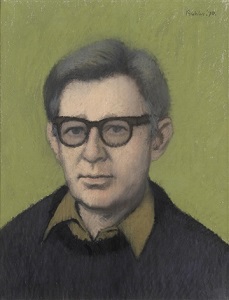
Laurie Lee (26 juni 1914 – 13 mei 1997)
Portret door Robert Buhler, 1970
De Amerikaanse schrijfster Pearl S. Buck werd geboren in Hillsboro West-Virginia, op 26 juni 1892. Zie ook alle tags voor Pearl S. Buck op dit blog.
Uit: The good earth
„It was Wang Lung’s marriage day. At first, opening his eyes in the blackness of the curtains about his bed, he could not think why the dawn seemed different from any other. The house was still except for the faint, gasping cough of his old father, whose room was opposite to his own across the middle room. Every morning the old man’s cough was the first sound to be heard. Wang Lung usually lay listening to it, and moved only when he heard it approaching nearer and when he heard the door of his father’s room squeak upon its wooden hinges.
But this morning he did not wait. He sprang up and pushed aside the curtains of his bed. It was a dark, ruddy dawn, and through a small square hole of a window, where the tattered paper fluttered, a glimpse of bronze sky gleamed. He went to the hole and tore the paper away.
‘It is spring and I do not need this,’ he muttered.
He was ashamed to say aloud that he wished the house to look neat on this day. The hole was barely large enough to admit his hand, and he thrust it out to feel of the air.
A small soft wind blew gently from the east, a wind mild and murmurous and full of rain. It was a good omen. The fields needed rain for fruition. There would be no rain this day, but within a few days, if this wind continued, there would be water. It was good. Yesterday he had said to his father that if this brazen, glittering sunshine contin-ued, the wheat could not fill in the ear. Now it was as if Heaven had chosen this day to wish him well. Earth would bear fruit.
He hurried out into the middle room, drawing on his blue outer trousers as he went, and knotting about the full-ness at his waist his girdle of blue cotton cloth. He left his upper body bare until he had heated water to bathe himself. He went into the shed which was the kitchen, leaning against the house, and out of its dusk an ox twisted its head from behind the corner next the door and lowed at him deeply.The kitchen was made of earthen bricks: the house was, great squares of earth dug from their ow fields, and thatched with straw from their own wheat. Out of their own earth had his grandfather in his youth fashioned also the oven, baked and black with many years of meal-preparing. On top of this earthen structure stood a deep, round, iron cauldron.”
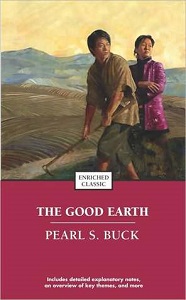
Pearl S. Buck (26 juni 1892 – 6 maart 1973)
Cover
Duitse schrijver Stefan Andres werd geboren op 26 juni 1906 in Breitwies bij Trier. Zie ook alle tags voor Stefan Andres op dit blog.
Uit: Die Sintflut
“Ich grüße den Normer und in ihm die neue Zukunft der Genormten.’ Nun dankte der Normer dem Confessor mit einem Zeichen und begann: ‘Genormte, lieber Confessor! credimus, quod optamus, sagt der Lateiner, leicht glauben wir das, was wir heftig verlangen. Der Confessor hat so sehr nach dein Normer verlangt, daß ihm sein Glaube leicht fallt. Doch das heißt nicht, daß er 1,;ichtgliiubig ist, wie das Menschen, die etwas verlangen, so leicht werden. Ich darf Ihnen, nein, ich muß Ihnen in diesem ersten Augenblick mei-nes Amtsantrittes sagen, ich habe mich legitimiert. Und so stehe ich nun vor euch als euer Normer. Was heißt das: Normer? Ich frage nicht, um eine Antwort zu erhalten, denn das ist das Wesen des Normers, daß ihr fragt und er euch die Ant-worten erteilt. Und daß er euch die einzig richtigen und wichti-gen Fragen zu stellen lehrt. Der Normer ist die Prägung, das sagte der Confessor richtig. Ich präge euch in meinem Sinne, nach mei-nem Bilde, das ich vom Menschen habe!< Der Normer trat darauf vom Podium herab, ließ die Genorm-ten einzeln heranführen und gab jedem die Hand. Wahrend die Diener nun die violetten Vorhänge rings um den Schachsaal an den Schnüren herabkommen ließen und rote aufzogen, schar-lachrote Vorhänge, gingen die Geladenen ins Diwanzimmer. So begann dieser Abend, diese Nacht ! >Agite, bibite!‹’ rief der Normer leutselig strahlend, die Normfasten sind vorbei, Purpur beherrscht die Stunde!’ Und keiner vermochte, so gewissenhaft auch ein jeder bis zur Stunde das Abstinenzgebot gehalten hatte, seinen einleuchtenden Gründen, sich dann und wann ans Becher zu laben, auch nur kurz zu widerstehen, von zwei Ausnahmen abgesehen: der Confessor zog sich sofort zurück, sein gefähr-deter Gesundheitszustand war ihm, allen sichtbar, aufs Gesicht geschrieben. Auch Tollet verließ uns bald, sein Fortgehen war uns eine Erleichterung. Sollen sie alle gellem, rief der Normer, >die Trübseligen, die Engen, die Freudlosen. Ich bringe euch das große Fest ! Ich liebe die Verzückten! Die Gläser gefüllt, wir wol-len die Welt erneuern! Die Genormten werden der Welt zeigen, wie man sie schöner macht!“
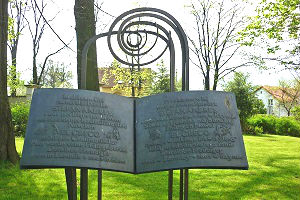
Stefan Andres (26 juni 1906 – 29 juni 1970)
Monument ter herinnering aan de schrijver in het park van slot Łomnica in Mysłakowice, Polen.
De Deense schrijver Martin Andersen-Nexø werd geboren op 26 juni 1869 in Kopenhagen. Zie ook alle tags voor Martin Andersen-Nexø op dit blog.
Uit: Die Passagiere der leeren Plätze (Vertaald door Ellen Schou en Karl Schodder)
„Und so vergingen die Jahre damit, am Tage sie alle zu versorgen und nachts, wenn sie zu Bett waren, ihre Kleider instand zu halten, damit sie am nächsten Morgen sauber und heil wären. Sich mit Dingen darüber hinaus zu beschäftigen, dazu reichte niemals die Zeit. Dann begannen die Kinder eins nach dem andern zu sterben, die einen im frühen Alter, andere erst, als sie schon herangewachsen waren und sie einem eine kleine Hilfe gewesen wären. Der Mann war einmal bei der Arbeit zu Schaden gekommen, eine Reihe von Jahren kränkelte er, und als sie so lange Gutes und Schlechtes miteinander geteilt hatten, dass sie daran denken konnten, silberne Hochzeit zu feiern, starb er. Da war endlich Zeit, die Hände eine Weile in den Schoß zu legen und nachzudenken, und Madame Jensen entdeckte, dass sie eine einsame alte Frau geworden war, und begann Sehnsucht nach der Heimat ihrer Kindheit zu verspüren. Sie fing also an, auf die Reise zu sparen, aber es wollte nie gelingen, das Geld zusammenzubringen. Jedes Mal wenn sie meinte, nun den Betrag beisammen zu haben, kam die Miete oder sonst etwas dazwischen und fraß ihr das Geld vor der Nase weg. Zweimal war das Heimweh so stark in ihr geworden, dass es sie zum Bahnhof getrieben hatte;
das eine Mal wurde sie vom Schaffner vor Abgang des Zuges angehalten; das andere Mal gelangte sie bis nach Korsör, ehe sie gefasst und zurückbefördert wurde. „Das Mal war es wirklich nahe daran, dass man bestraft worden wäre — obwohl man keiner Menschenseele den Platz weggenommen hatte”, sagte die Alte und bebte noch immer bei dem Gedanken daran.
Dann hatte sie es aufgegeben. „Jetzt hat man nur noch einen einzigen Wunsch — den müden Kopf bald dahin legen zu dürfen, wo keine Wagen hinkommen.“
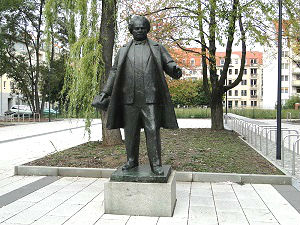
Martin Andersen-Nexø (26 juni 1869 – 1 juni 1954)
Standbeeld in Dresden
Zie voor nog meer schrijvers van de 26e juni ook mijn blog van 26 juni 2017 en eveneens mijn blog van 26 juni 2016 deel 2.

